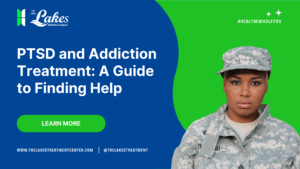The start of a new school year can be an exciting time, but it’s not without its potential stressors. For college students, the back-to-school season can take a significant toll on mental health and create conditions that lead some to struggle with addictions.
That’s true for freshmen transitioning to college, students with heavy work or school loads, students with children and families, and those grappling with the anxiety of getting back into the classroom after two tough pandemic years. It’s also the case for students who are living with mental health conditions or substance abuse – which studies have shown are increasing among college students:
- A 2021 survey of 100,000 students found that 16% of college men and 33% of college women had been diagnosed with anxiety, and 14% of college men and 25% of college women had been diagnosed with depression.
- A 2022 study of over 350,000 students from more than 370 campuses found that the number of students who met the criteria for one or more mental health problems doubled from 2013 to 2021.
- A 2021 survey of LBGTQ+ students found that students who identify as LBGTQ+ reported greater rates of mental health concerns than their non-LGBTQ+ peers and higher rates of using alcohol and drugs to cope.
Whatever stressors may exist for you or the student in your life, there are ways to prioritize mental health and manage the types of emotions that can lead to substance misuse. Here are a few strategies to keep in your mental health toolkit this school year.
The Importance of Good Mental Health During College
Mental health is a vital aspect of our overall well-being, encompassing our emotional, psychological, and social health. It influences how we think, feel, and act, affecting every part of our lives. Mental health conditions, such as anxiety and depression, are common and can impact anyone, regardless of age or background.
Understanding mental health is crucial for promoting mental wellness and recognizing when to seek help. Just as physical health is essential for a good quality of life, so too is mental health. Poor mental health can negatively affect physical health, leading to a range of issues from sleep disturbances to chronic illnesses.
The good news is that mental health conditions can be managed with the right treatment and support. Early intervention is key, and seeking help from mental health professionals can make a significant difference. There are numerous mental health resources available, including therapy, support groups, and educational materials, to help individuals navigate their mental health journey.
Find Your Coping Skills to Manage Stress
Many college students use drugs and alcohol to cope with the stress and anxiety of school and personal problems, which is why it’s worth exploring healthier coping strategies to manage stress during the school year. Explore some of these strategies when times get tough:
- The 54321 Grounding strategy, which involves looking around you and naming 5 things you can see, 4 things you can hear, 3 things you can feel, 2 things you can smell, and 1 thing you can taste. Focusing on your senses can help you stay grounded in the present and provide a starting point for self-reflection and problem-solving.
- Focus on your breathing, which can help you step back from a moment of crisis or anxiety and disconnect from distractions. You can use a guide like this to help with your breathing exercises.
- Write it out. If you’re feeling anxious or overwhelmed, one way to find calm is to take a moment and reflect. Journaling or writing about how you feel can be an effective mindfulness tool.
- Go for a walk. Research has shown a positive correlation between getting active outdoors and mental health, which is why our facility offers many outdoor activities as part of our residential treatment program. Try getting outside and going for a walk next time you need some calm.
- Listen to music or talk it out. According to Crisis Text Line, listening to music or talking with friends and family were the top coping skills reported by college students who reached out for help. Try exploring these options when you feel anxious or overwhelmed.
- Get help. The Crisis Lifeline is a critical resource for students in distress, offering 24/7 support and confidentiality.
Create a Mental Health Crisis Plan
Our emotions and mental health are fluid, and situations or feelings can arise that we’re not always prepared to handle. By being proactive and creating a mental health crisis plan, you can position yourself to better manage difficult situations if they arise.
Mental health crisis plans can be as simple as listing out a few strategies or resources you can turn to when times are tough, such as:
- Three things you can do to cope and find calm (such as breathing, listening to music, or using the 54321 Grounding strategy).
- Three people you can call and talk to when you’re feeling overwhelmed.
- Three things you do for self-care that make you feel better.
- Contact information for a mental health expert in your vicinity.
Sometimes, the process of creating a crisis plan is enough to help you remember the tools you can use when times are tough. But you can also make and keep physical copies to consult when emotions or anxiety become overwhelming. The Crisis Text Line has a crisis plan template you can print out for yourself and your friends.
Pick Up Some Mental Health School Supplies
Back-to-school shopping will always include the essential books, pens, and papers, but you can add some mental health school supplies to the list as well. These supplies can vary by person and the types of things they find helpful or calming.
Some examples:
- Music, movies, or a favorite book to help you cope with stress.
- Notecards for your crisis plan or list of mental health resources.
- Items/dorm decorations that remind you of home or create a calming environment.
- Self-care products such as essential oils, bath and beauty supplies, or other items that calm you.
- A yoga mat, gym membership, or other things you can use to get active, exercise, and move your body in healthy ways.
Additionally, students are encouraged to explore more resources related to emotional health and wellness to better manage mental health challenges.
Explore Available Mental Health Resources
Seeking the help and support of others can be the best way to deal with mental health challenges. Mental health resources play a vital role in supporting students’ mental health. Thankfully, there are many resources out there, and it’s a good idea to see what’s available in case you need a mental health check-in during the school year.
Some places to look include:
- Your school. Many colleges and universities have invested more into student mental health services in recent years. If you need help or want to know where to go when you need it, try to see what counseling and mental health services your school offers. Some schools may have mental health providers or special programs and student groups that align with your needs.
- Your friends and family. Talking to friends and family is a great way to explore your feelings and find solutions with the help of people you trust.
- Support hotlines. There are many hotlines and services that offer support in the form of telephone counseling, crisis intervention, information about helpful resources. This includes Crisis Text Line, which allows you to text a number or send a message online to talk with a Crisis Counselor, the National Suicide Prevention Lifeline (988), and hotlines specific to students, such as the National Grad Crisis Line.
- Addiction treatment. If school-related stressors and mental health challenges have been a factor behind substance misuse, you’re not alone. School stress and temptation lead many college students along a difficult path. Seeking treatment from experienced rehabilitation specialists can be the best thing you do for your health, well-being, and future self.
Managing Daily Life
Managing daily life can be particularly challenging when dealing with mental health conditions. However, prioritizing self-care and developing healthy coping mechanisms can make a significant difference. Ensuring you get quality sleep and engaging in regular physical activity are foundational practices for maintaining mental wellness.
Mindfulness and stress management techniques, such as meditation and deep breathing exercises, can help manage daily stress. Building a support network of friends, family, and mental health professionals provides essential emotional support and guidance.
Setting realistic goals and breaking tasks into smaller, manageable steps can help you stay on top of daily responsibilities without feeling overwhelmed. Practicing self-compassion and acknowledging your limitations can prevent burnout and promote emotional wellness.
Remember, it’s okay to seek help and support when needed. Mental health resources, such as crisis lifelines and online support groups, are available to provide immediate assistance and guidance.
Staying Active and Engaged
Staying active and engaged is a cornerstone of maintaining mental wellness. Physical activity, whether it’s a structured exercise routine or casual sports, can significantly improve mood and reduce stress. Engaging in hobbies and creative activities can provide a sense of purpose and fulfillment, enhancing emotional health.
Building and maintaining social connections, including relationships with romantic partners and friends, offers vital emotional support. Volunteering and giving back to the community can also provide a profound sense of purpose and satisfaction.
Practicing mindfulness and staying present in the moment helps you remain engaged with your surroundings and experiences. Seeking out new challenges and experiences can keep life exciting and fulfilling.
Mental health resources, such as therapy and support groups, can offer additional guidance and support to help you stay active and engaged. By incorporating these practices into your daily life, you can foster resilience and enhance your overall well-being.
Addiction Treatment Services for College Students
If you or the student in your life are struggling with an addiction to drugs or alcohol, our team of caring and experienced specialists at The Lakes Treatment Center wants to help.
Located on beautiful Lake Tulloch, we offer a range of addiction treatment services personalized to each patient’s unique needs. From detox to drug rehab and alcohol rehab, our specialists take a whole-person approach to helping those struggling with substance misuse and co-occurring disorders.
To learn more about our recovery center and how we can help you, call (209) 309-3573 or contact us online.




